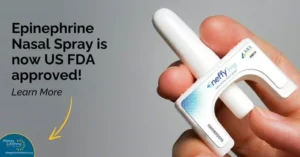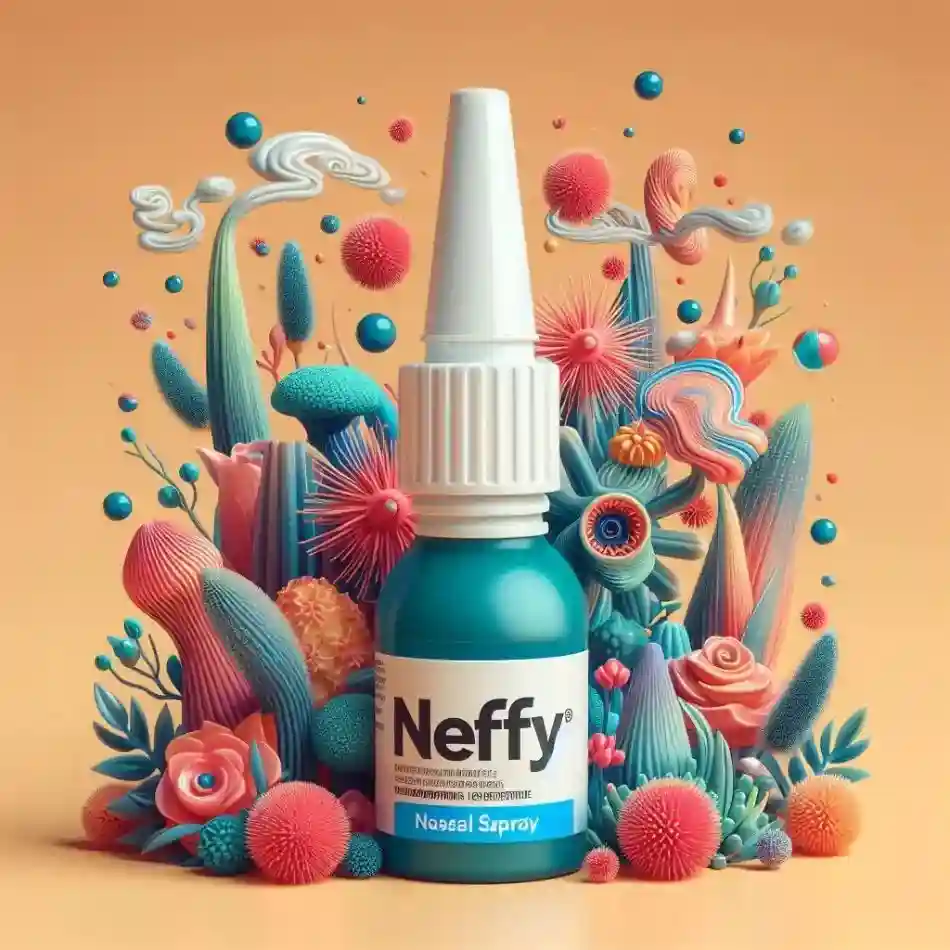New Breakthrough in Allergy Treatment: FDA Approves First Nasal Spray “Neffy” for Severe Allergic Reactions
In a groundbreaking development for allergy management, the U.S. Food and Drug Administration (FDA) has granted approval for Neffy, the first nasal spray designed to treat severe allergic reactions. This innovative treatment represents a significant advancement in the field of allergy care, offering a new, potentially life-saving option for individuals experiencing anaphylaxis, a severe and potentially fatal allergic reaction.
Anaphylaxis is a severe, life-threatening allergic reaction that typically involves multiple parts of the body and is a medical emergency. Research estimates anaphylaxis may cause up to 200 deaths each year.
The Evolution of Allergy Treatments
For decades, epinephrine auto-injectors have been the standard treatment for anaphylaxis, a condition triggered by allergens such as certain foods, insect stings, or medications. These auto-injectors, while effective, have limitations, including the need for manual administration and the potential for injection site reactions. The approval of Neffy marks a notable shift in how severe allergic reactions can be managed, with the added convenience and ease of use offered by a nasal spray.
Neffy’s approval by the FDA is the culmination of years of research and development aimed at providing a more user-friendly solution for emergency allergic reactions. This new treatment offers the potential to improve compliance and accessibility, making it a game-changer for patients and caregivers alike.

Neffy Nasal Spray
How Neffy Works
Neffy operates by delivering a dose of epinephrine—a critical hormone that counteracts the symptoms of anaphylaxis—through the nasal mucosa. The nasal spray is designed to be as effective as an intramuscular injection but with the advantage of a simpler administration process. This method of delivery can be particularly advantageous in emergency situations where time is of the essence.
The nasal spray format allows for rapid absorption of epinephrine, which can help to swiftly stabilize the patient’s condition during an anaphylactic episode. Neffy’s formulation is designed to ensure that the drug is absorbed efficiently through the nasal membranes, providing a quick and effective response to severe allergic reactions.
Clinical Trials and Safety Profile
The approval of Neffy followed extensive clinical trials that demonstrated its safety and efficacy. These trials included diverse patient populations and various scenarios of allergic reactions. The results showed that Neffy was effective in delivering a therapeutic dose of epinephrine, comparable to that delivered by traditional auto-injectors.
Participants in the clinical trials reported that Neffy was easy to use and well-tolerated. The most common side effects observed were mild and included nasal irritation and a temporary burning sensation. These side effects were generally transient and did not interfere with the overall efficacy of the treatment.
The clinical data supporting Neffy’s approval also highlighted its potential for improving patient outcomes. In emergency situations, the ease of use and rapid action of the nasal spray could be critical factors in managing severe allergic reactions effectively and promptly.
Implications for Patients and Caregivers
The introduction of Neffy offers several advantages over traditional epinephrine auto-injectors. For patients with severe allergies, the nasal spray presents a more discreet and less invasive option for emergency treatment. This can be particularly beneficial in social settings or situations where an injection might be impractical or uncomfortable.
Caregivers and family members will also benefit from the simplicity of Neffy. Training to use the nasal spray is expected to be less complex compared to the training required for auto-injectors. This can lead to greater confidence and preparedness in managing allergic emergencies, potentially reducing the risk of complications from anaphylaxis.
Additionally, Neffy could address some of the challenges associated with carrying and storing auto-injectors. The nasal spray is compact and does not require refrigeration, making it more convenient for individuals who need to carry emergency medication with them at all times.
Challenges and Future Outlook
Despite the promising features of Neffy, there are still challenges to consider. The nasal spray may not be suitable for all individuals, particularly those with nasal or respiratory conditions that could affect drug absorption. Ongoing research and post-marketing studies will be crucial in evaluating the long-term effectiveness and safety of Neffy in various populations.
Moreover, healthcare professionals and patients will need to adapt to the new treatment modality. Awareness and education about the proper use of Neffy will be essential in ensuring its successful integration into allergy management protocols.
Looking ahead, Neffy’s approval could pave the way for further innovations in allergy treatment. The success of this nasal spray might inspire additional research into alternative delivery systems for epinephrine and other allergy medications, potentially expanding the range of options available for managing severe allergic reactions.
Conclusion
The FDA’s approval of Neffy marks a significant milestone in the treatment of severe allergic reactions. By offering a nasal spray alternative to traditional epinephrine auto-injectors, Neffy has the potential to transform how anaphylaxis is managed, providing a more accessible and user-friendly option for patients and caregivers. As this new treatment becomes available, it represents a hopeful advancement in allergy care, promising improved outcomes and enhanced quality of life for those affected by severe allergic reactions.
Q1: What is Neffy, and what has it been approved for?
Answer: Neffy is a newly approved nasal spray that delivers epinephrine to treat severe allergic reactions, specifically anaphylaxis. The U.S. Food and Drug Administration (FDA) granted approval for Neffy as the first nasal spray treatment for this life-threatening condition.
Q2: How does Neffy work to treat anaphylaxis?
Answer: Neffy delivers a dose of epinephrine through the nasal mucosa. Epinephrine helps counteract the symptoms of anaphylaxis by quickly stabilizing the patient’s condition. The nasal spray format allows for rapid absorption of the medication, which can be critical in emergency situations.
Q3: What are the advantages of using Neffy compared to traditional epinephrine auto-injectors?
Answer: Neffy offers several advantages over traditional epinephrine auto-injectors. It is less invasive, easier to use, and does not require an injection. This can be particularly beneficial in social situations or emergencies where a quick and discreet treatment is needed. Additionally, Neffy is compact and does not require refrigeration, making it more convenient to carry.
Q4: What were the key findings from the clinical trials of Neffy?
Answer: Clinical trials showed that Neffy was effective in delivering a therapeutic dose of epinephrine comparable to that of traditional auto-injectors. Participants reported that Neffy was easy to use and well-tolerated. Common side effects included mild nasal irritation and a temporary burning sensation, which were generally transient.
Q5: Are there any limitations or potential challenges associated with Neffy?
Answer: Neffy may not be suitable for everyone, particularly individuals with nasal or respiratory conditions that could affect drug absorption. Ongoing research and post-marketing studies will be important to evaluate its long-term effectiveness and safety in various populations. Additionally, healthcare professionals and patients will need to adapt to the new treatment modality, requiring awareness and education about proper use.
Q6: How could Neffy impact patients and caregivers?
Answer: Neffy could significantly impact patients and caregivers by providing a more user-friendly option for managing severe allergic reactions. Its ease of use and convenience could enhance preparedness and reduce the risk of complications from anaphylaxis. For caregivers, the simplicity of the nasal spray could lead to greater confidence in managing allergic emergencies.
Q7: What are the potential future developments related to Neffy and allergy treatments?
Answer: Neffy’s approval may inspire further innovations in allergy treatment. The success of this nasal spray could lead to additional research into alternative delivery systems for epinephrine and other allergy medications. This could expand the range of options available for managing severe allergic reactions and potentially improve patient outcomes.
Q8: Why is the approval of Neffy considered a significant milestone in allergy care?
Answer: Neffy’s approval is a significant milestone because it represents the first nasal spray treatment for severe allergic reactions, offering a new, potentially life-saving option for patients. It marks a shift in how anaphylaxis can be managed, providing a more accessible and user-friendly alternative to traditional epinephrine auto-injectors. This advancement has the potential to improve the quality of life for individuals affected by severe allergies.








